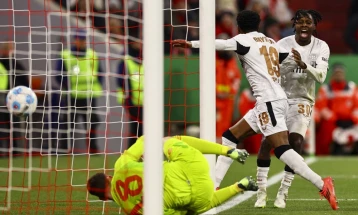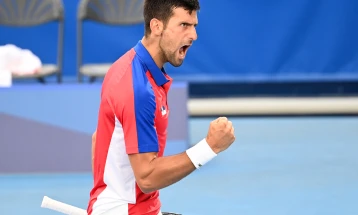Swiatek: One-month doping ban ‘worst experience of my life’
- Iga Swiatek has described being given a one-month ban as the “worst experience of my life” as the tennis world was stunned by another doping case involving one of its most high-profile players.

London, 29 November 2024 (dpa/MIA) - Iga Swiatek has described being given a one-month ban as the “worst experience of my life” as the tennis world was stunned by another doping case involving one of its most high-profile players.
The Pole was ranked world number one when she provided a sample containing the angina medication trimetazidine in an out-of-competition test on August 12.
The International Tennis Integrity Agency (ITIA) accepted it was caused by contamination of the regulated non-prescription medication melatonin, manufactured and sold in Poland, which Swiatek took for jet lag and sleep issues.
Swiatek’s level of fault was therefore considered to be at the lowest end of the range for ‘No Significant Fault or Negligence’.
The news comes only three months after it was revealed men’s world number one Jannik Sinner had failed two doping tests in March but was deemed not to be at fault and was not suspended, although that has been appealed by the World Anti-Doping Agency.
Swiatek was provisionally suspended from September 22 until October 4 but that was not made public, with the three tournaments the 23-year-old missed attributed to personal matters and a change of coach.
Swiatek must serve an additional eight days to December 4 to make up the month, while she also forfeits her prize money from reaching the semi-finals of the Cincinnati Open, the tournament directly following the test.
The five-time grand slam champion, now ranked second in the world, wrote on Instagram: “I’m finally allowed ... so I instantly want to share with you something that became the worst experience of my life.
“In the last 2.5 months I was subject to strict ITIA proceedings, which confirmed my innocence. The only positive doping test in my career, showing unbelievably low level of a banned substance I’ve never heard about before, put everything I’ve worked so hard for my entire life into question.
“Both me and my team had to deal with tremendous stress and anxiety. Now everything has been carefully explained, and with a clean slate I can go back to what I love most. I know I will be stronger than ever.
“I’m leaving with you a long video and right now I’m just relieved it’s over. I want to be open with you, even though I know I did nothing wrong.
“Out of respect for my fans and the public, I’m sharing all the details of this longest and toughest tournament of my career. My biggest hope is that you will stay with me.”
The Sinner case caused much disquiet within tennis, with players and coaches citing their belief that he was treated differently because of his status, although this was strongly refuted by the relevant authorities.
Asked if there was effectively a two-tier system in operation, ITIA chief executive Karen Moorhouse said: “I think it’s a really fair question. I think ultimately these two particular cases turned on their own facts.
“In the case of Sinner, because the prohibited substance was used by a member of his entourage he was easily able to ascertain that and go to a tribunal chair with an explanation which satisfied him there was likely to be a finding of no fault or negligence.
“In Swiatek’s case, she relatively quickly identified what product it was that was contaminated. Of course, if you have more resources you can perhaps throw more at that.
“Though we’ve had two high-profile doping cases in recent months in tennis, it’s worth saying these are cases of inadvertent breaches so we don’t think there’s cause for concern for tennis fans, but it is an opportunity for players and their teams to reflect on their approach to anti-doping.”
British player Tara Moore, who served a 19-month provisional suspension before it was accepted she bore no fault, wrote on the social media site X: “I took 19 months off as I had to make a “change to my team” too guys.
“Let’s not forget, mine was also contamination, and 2 other people also tested positive yet ITIA are appealing my case. Why is no one seriously looking into the corruption of the organisations that govern us?”
It is not the first time trimetazidine has been central to a high-profile doping case, with the 23 Chinese swimmers controversially cleared to compete and teenage Russian figure skater Kamila Valieva also testing positive for the substance.
The WTA backed Swiatek, saying in a statement: “The WTA fully supports Iga during this difficult time.
“Iga has consistently demonstrated a strong commitment to fair play and upholding the principles of clean sport, and this unfortunate incident highlights the challenges athletes face in navigating the use of medications and supplements.”
MIA file photo











